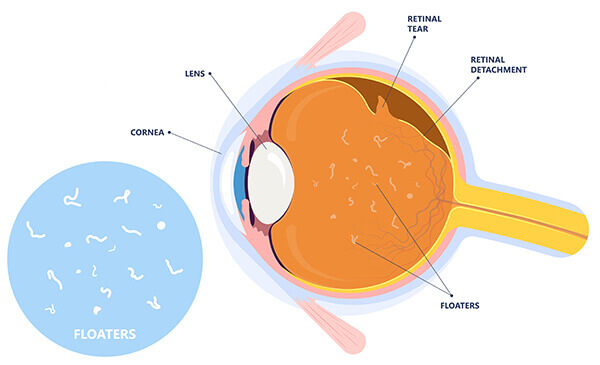Introduction
Have you ever noticed tiny specks, cobweb-like strands, or shadowy shapes drifting across your vision? These are known as eye floaters, and while they are usually harmless, they can sometimes indicate underlying eye conditions. Understanding what causes floaters and when to seek medical attention is crucial for maintaining good eye health. In this blog, we’ll explore the nature of eye floater, their causes, symptoms, treatment options, and when you should consult an eye specialist.
What Are Eye Floaters?
Eye floaters are small, shadowy shapes that appear to float across your field of vision. They are most noticeable when looking at a bright background, such as the sky or a white screen. Floaters are caused by tiny clumps of gel or cells inside the vitreous, the clear gel-like substance that fills the eye. As light passes through the eye, these clumps cast shadows on the retina, making them appear as moving spots or strands.

Causes and Symptoms of Eye Floaters
Common Causes
- Aging and Vitreous Changes – The most common cause of floaters is the natural aging process. As we age, the vitreous gel in our eyes gradually shrinks and becomes more liquid, leading to the formation of tiny clumps or strands.
- Posterior Vitreous Detachment (PVD) – This occurs when the vitreous gel pulls away from the retina, a common occurrence after the age of 50.
- Eye Infections or Inflammation – Conditions like uveitis (inflammation of the middle layer of the eye) can cause debris to accumulate in the vitreous, leading to floaters.
- Eye Trauma or Injury – A direct impact to the eye can result in floaters due to bleeding or structural damage.
- Retinal Tears or Detachment – In severe cases, floaters may signal a retinal tear or detachment, which requires immediate medical attention.
- Diabetic Retinopathy – People with diabetes may develop floaters due to bleeding inside the eye caused by damaged blood vessels.
Symptoms of Eye Floaters
- Small dark spots or threads drifting in the vision.
- Shapes that appear to move when you try to look directly at them.
- Sudden increase in the number of floaters.
- Flashes of light in the peripheral vision (which may indicate retinal detachment).
Treatment and Management of Eye Floaters
When Do Floaters Require Treatment?
Most floaters are harmless and do not require medical intervention. However, if you experience a sudden increase in floaters, flashes of light, or a dark curtain covering part of your vision, you should seek immediate medical attention as this could indicate a retinal tear or detachment.
Treatment Options
- Observation and Adaptation – In many cases, the brain learns to ignore floaters, and they become less noticeable over time.
- Vitrectomy – A surgical procedure where the vitreous gel is removed and replaced with a clear solution. This is usually reserved for severe cases where floaters significantly impact vision.
- Laser Therapy (YAG Laser Vitreolysis) – This non-invasive procedure uses laser energy to break up large floaters, making them less noticeable. However, it is not widely recommended due to potential risks.
- Treating Underlying Conditions – If floaters are caused by inflammation, diabetes, or retinal issues, addressing the root cause can help reduce their occurrence.
Expert Insights from Dr. Smita Mukherjee
Dr. Smita Mukherjee is a senior Ophthalmologist with more than 30 years of experience. After completing her post-graduation from Seth G.S. Medical College with academic honors, she joined the faculty of the same college, where she gained extensive experience in all branches of ophthalmology.
As a recognized University Post Graduate teacher, Dr. Mukherjee has trained multiple batches of postgraduate students. She started her private practice in 1997 and now consults at Eye Solutions Clinic, Chembur.
Specializations: Cataract Surgery, Phacoemulsification, Refractive Errors, Diabetic Retinopathy, and Age-Related Macular Degeneration.
Consultation Location: Eye Solutions Clinic 401, Pearl Belleza, D. K. Sandu Marg, 19th Road Corner, Chembur, Mumbai 400071
FAQs
1. Are eye floater permanent?
Some floaters may fade over time, but they generally do not disappear completely.
2. Can stress or screen time cause floaters?
While stress and excessive screen time can cause eye strain, they are not direct causes of floaters.
3. Are floaters a sign of blindness?
Floaters themselves are not dangerous, but a sudden increase in floaters may indicate a retinal tear or detachment, which requires immediate attention.
4. Can eye exercises reduce floaters?
There is no scientific evidence that eye exercises can eliminate floaters.
5. Do dietary changes help in reducing floaters?
A healthy diet rich in antioxidants, omega-3 fatty acids, and vitamin C can support eye health, but it may not directly reduce floaters.
6. Can floaters be removed naturally?
Most floaters become less noticeable over time, but they do not go away naturally.
7. Should I see an eye doctor if I have floaters?
If you experience a sudden increase in floaters, flashes of light, or vision loss, consult an eye specialist immediately.
Conclusion
Eye floater are a common occurrence and, in most cases, are harmless. However, it is essential to understand when they may signal a more serious condition requiring medical intervention. Regular eye check-ups and prompt medical attention for any sudden changes in vision can help protect your eyesight. If you have concerns about eye floaters or any other vision issues, consult an experienced ophthalmologist like Dr. Smita Mukherjee for expert guidance and treatment. Your eye health is vital—prioritize it today!

